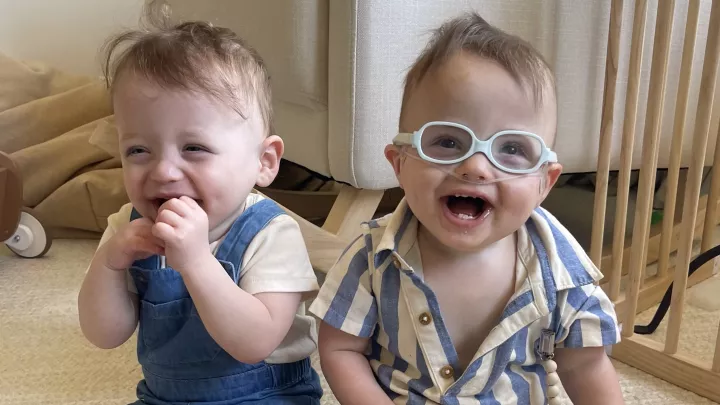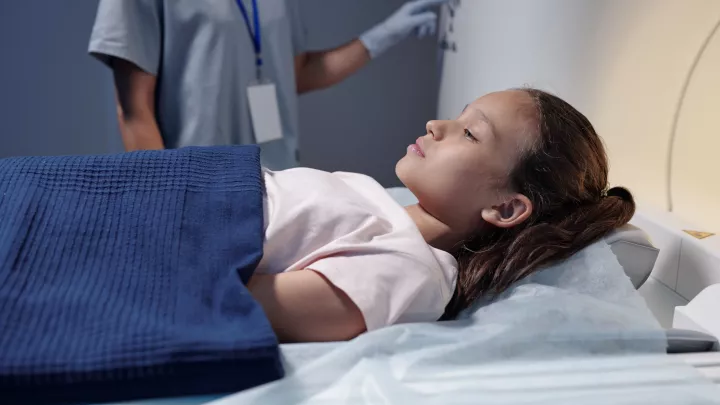What to Expect When Your Child Has Heart Surgery
Your child has been referred for heart surgery at Children’s Hospital Los Angeles (CHLA). Please use this information to learn about what you need before, during, and after heart surgery. If you have any questions or concerns, please speak with any member of your child’s Heart Surgery Care Team.
What happens during the weeks and days before heart surgery?
Every patient has different needs. In the days and weeks before the surgery, you will meet with the heart surgeon to talk about your child’s needs. You’ll get information about how we will prepare for the procedure. You will also complete paperwork to give us your permission for the surgery. This is known as the “consent process” and the paperwork is called "consent forms".
Will my child need blood during surgery?
It is possible that your child may need blood during or after surgery. To prepare for this, there are a few options for blood donations.
Blood Donor Center Blood: This blood comes from the hospital’s blood bank and has been donated by employees and community members. It is fully tested and safe and can be used if blood from directed donors is not available.
Directed donor blood: Blood and/or platelets (important for blood clotting and to prevent bleeding) donated for your child from family and friends.
- Donors must be 17 years old or older and meet other requirements.
- Whole Blood Donation or Platelet Donation
Make appointments 3 to 14 days before your child’s surgery.
- Platelet donations take about 90 minutes.
- Whole blood donations take about 30 minutes.
CHLA Blood Donor Center
4650 Sunset Blvd.
Los Angeles, CA. 90027
(323) 361-2441
Other important information
- Not everyone can donate blood or platelets. A health screening is needed for all donors to make sure they are able to donate.
- The blood donor center tests all blood and platelet donations to make sure they are safe for your child. For this reason, all donations must be done at least three days before the surgery.
- Blood donations that do not match your child’s blood type will be used to help other children in need.
Autologous or Self Donation: In rare cases, children having surgery may be able to donate and store their own blood ahead of time for use during their surgery. To do this, the child:
- Must weigh at least 85 pounds and be able to give permission to donate.
- Must meet all hospital requirements (rules) for blood donation,
- Must be approved by their doctor and the Blood Donor Center medical director
- Must donate at least one week before the surgery
IMPORTANT!
If your child is sick in any way during the week before the surgery, please take them to your pediatrician and call your surgeon’s office.
The Preoperative (before surgery) Work-up Day
On this day, your child will have all the tests they need before surgery. You will also fill out paperwork and get information needed before surgery.
Begin by visiting CHLA’s Admitting Department, where you will complete paperwork. Please be sure to bring your child’s medical insurance information with you. You will then be sent to a work-up area.
Your child will have a physical exam and update their medical history. You may want to bring any medical records with you. Your child will have blood tests and an X-ray. Your child may also need an electrocardiogram (EKG). This test checks the heart’s electrical system.
Preoperative staff will talk to you and your child about what will happen while you are in the hospital. It is a great time to ask any questions you may have. CHLA has specialists who can explain tests and the surgery to your child in words they understand. You can ask that one of these specialists meet with your child to help them get ready for surgery.
What do I do with my child’s medications?
- If your child is taking aspirin or Plavix (clopidogrel), please check with the surgeon’s office regarding stopping or continuing the medication.
- If your child is on Lanoxin (digoxin), check with your surgeon’s office about whether or not to hold the medication.
- If your child is taking Coumadin (warfarin), Lovenox (enoxaparin), or Arixtra (fondaparinux), please ask the surgeon’s office when you should stop giving the medication and if your child will need to transition to another form of blood thinner before surgery.
- If your child is taking any inhaled medications, please discuss this with the health care provider at the time of your preoperative visit.
- If your child is taking captopril, Epaned (enalapril), or lisinopril, please do not give these the night before or morning of surgery.
- If your child is taking an antiseizure medication, Synthroid (levothyroxine), Inderal (propranolol), or Revatio (sildenafil), please continue to give these to your child at their scheduled times, including the morning of surgery (with sips of water—less than one ounce). Please bring these medications with you on the day of surgery.
- You may give all other routine medications up until midnight the night before surgery.
- If you have any questions about medications, please call the surgeon’s office or ask at the time of your child’s preoperative appointment.
The Night Before Surgery
A nurse in the preoperative surgery area will call you to tell you what time to be at the hospital for the surgery. Please call your surgeon’s office if you have not heard anything by late afternoon the day before the surgery.
- Your child’s stomach must be empty before the surgery. The nurse will tell you when your child should stop eating and drinking.
- Bathe your child in the evening, washing the chest and side areas really well for five minutes. You may use your child's regular shampoo and bathing supplies for the preoperative bath. Please avoid using lotions or creams afterwards.
- Pack a “comfort” item or two for your child, such as a favorite toy or blanket. Other helpful items include a small book, favorite music with player and earphones, or photographs. Bring your child’s eyeglasses, toothbrush and toothpaste and schoolwork too.
- After your child feels better and moves out of the ICU, your child may want to wear pajamas from home. Make sure to label all items with your child’s name.
The Day of Surgery
After you stop at the Information Desk (in the main lobby of the hospital) for a pass, go directly to the Preoperative Admitting Area. Once admitted, your child will change into hospital pajamas. The anesthesiologist (doctor specializing in managing your child’s pain) will speak with you before the surgery. Your child may be given medication to help your child relax.
A nurse from the Heart Care Team will go with your child to the Operating Room. After your child has been taken to the Operating Room, please go to the caregiver waiting area. The surgeons will meet you there after the surgery.
After Surgery
Intensive Care Unit (ICU) or Cardiothoracic Intensive Care Unit (CTICU):
In most cases, your child will go to an Intensive Care Unit (ICU) right after surgery. You will be able to be with your child in this unit. A team of experts in pediatric heart care will take care of your child. In the ICU, there will be some very advanced equipment that will monitor your child. The ICU staff will keep you informed about your child’s progress and explain the treatment plan and equipment to you. Please feel free to ask questions.
Cardiovascular Acute Care Unit:
Your child’s progress helps the team decide how long they stay in the ICU. When the care team thinks your child no longer needs close monitoring, they will be moved to the step-down unit, also known as CV Acute. The staff in this unit have special training in the care of children who have had heart surgery. The heart surgeon, cardiologist, nurse practitioner, nurse care manager and care coordinators will continue to care for your child until you go home.
What information do I need before I go home?
- Your child’s nurse will give you printed instructions for care at home after the surgery. These instructions include how to take care of the incision, what activities are allowed, what your child can or cannot eat, medications, when to call the doctors and follow-up appointments.
- Your child will come back to the hospital for at least one check-up with the surgical team in the first one to two weeks after going home. During this appointment, the team will check your child’s incision and remove any remaining stitches.
- You will need to schedule a follow-up appointment with your cardiologist and pediatrician in the first one to two weeks after going home. A full medical summary of your child’s surgery will be sent to your pediatrician and cardiologist, who will continue to manage your child’s care at home.
- If your child needs any medical equipment to return home, your nurse and care coordinator will work closely with you to order it. They will arrange home nursing visits if needed.
- Please call your surgeon’s office at any time if your child has any of the following symptoms: fever, redness, swelling or drainage at the incision site.
The Heart Surgery Care Team
There are many people on the team that will care for your child during their stay at CHLA. Here are a few of the team members you may meet:
Surgeon: This doctor is in charge of the team that will perform your child’s heart surgery and is also your child’s attending doctor (a doctor who is responsible for the overall care of your child) during the hospital stay.
Cardiologist: Your child’s heart doctor will visit while they are in the hospital and will continue to see your child, as needed, after the hospital stay.
Intensivist: This doctor is trained in the care of very sick children and will assist your surgeon in planning care in the ICU after surgery.
Hospitalist: This doctor is a pediatrician who manages the care of children who are in the hospital.
Cardiac Surgery Fellow: Already fully trained in heart surgery, this doctor is taking additional time to gain experience with pediatric heart surgery.
Anesthesiologist: This doctor is in charge of giving and monitoring anesthesia (medicine that keeps your child asleep and comfortable) during your child’s surgery. The anesthesiologist will check the medical history, including any possible drug allergies, while visiting with you and your child before surgery.
Care Manager or Care Coordinator: The care manager (a nurse) follows your child’s case in the hospital. This person knows about every part of your child’s care. They will help prepare you and your child to go home. They will arrange any care your child will need at home after the surgery.
Nurse Practitioners: These specially trained nurses work with doctors and nurses to help manage your child’s care while in the hospital.
Ambulatory Clinic Representative: This person will schedule your first appointment with the surgeon. The representative will gather information such as cardiology records, your child’s address, date of birth, and insurance coverage.
Surgery Scheduler: After you meet with the surgeon, a scheduler (person in charge of the surgery schedule) will set a date for the surgery. They will also get authorization for the surgery from your insurance company. You will talk to the surgery scheduler several times before the surgery.


